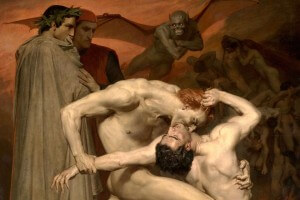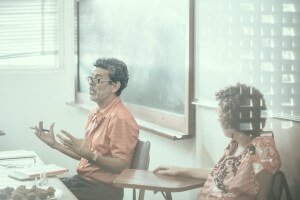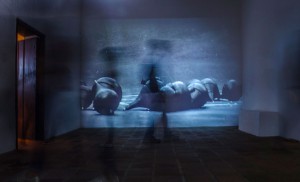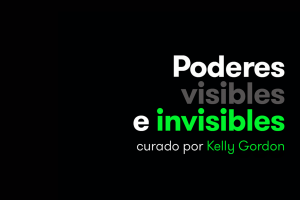Universidad Central de Venezuela
School of Literature
Elective seminar
(Also Academic Research Internship Seminar)
Professor Camila Pulgar with Natasha Tiniacos and the Backroom Caracas team
Semester 01-2016
Backroom Caracas:
Micropolitics of Creation, Archives, and the Cities of the Future
Desire, in whatever dimension it is considered, is never an undifferentiated energy, it is never a disorder. There are no universals, there is no bestial essence of desire. Desire is always the mode of production of something, desire is always the mode of construction of something.
Félix Guattari
Description of the Seminar
The main objective of this elective seminar, which can also be an internship seminar, is twofold. As the title announces, we will be attending the conceptual proposal of the digital contemporary art platform Backroom Caracas, as well as an exploration of the archival instinct and a look towards the cities of the future.
The student will enjoy two directions whose probable articulations will move her to different urban settings, from where she will raise and demarcate her field of work and research. On the one hand, we will hold discussions framed within the program of Backroom Caracas, which we will excavate, potentially, in terms of the contemporary break and the city that summons us. In the same way, we will generate singularities of creation to investigate and produce content for this art platform, which “emerged in 2013 as a digital publication to contribute to the discernment of the arts from conversations with creators and thinkers… Today …it is a hybrid platform that hosts and shares the work of national and international artists through our program of exhibitions… The fertility of creators and the complex moment of Venezuelan reality is the formula that encourages our projects.” On the other hand, rooting ourselves in our School, we will delve into the archival instinct and the cities of the future.
The participants will thus be offered a hybrid program of various semiotic flows that will seek to stimulate them and lead them into the final project. One will be that of encounters and creations with Backroom, its guests, and the Caracas that the platform projects today from its technological, artistic and didactic devices, with the clear intention of constructing a desiring, interactive audience, capable of generating answers: true processes of singularization and the micropolitical, considering that «every micropolitical problem consists precisely in trying to organize the processes of singularization at the very level at which they emerge» (Guattari and Rolnik). Secondly, the students will follow a series of sessions on the contemporary notion of archive (Spieker, Derrida, Benjamin, Foster, Foucault, Rancière, Appadurai, Chakrabarti) and on Caracas in terms of image.
The final work will be a recording or a sketch of the searches inside the ludic archives that the participants will generate ––their specific strokes at stake, their own mapping of desire: exploratory works, articulated directly from the agencies, the syntax (writings), and modes of semiotization about the past, the present, and the imminent future of Caracas in the image of each student.
Objectives
General objective:
This seminar aims to generate a meeting between the School of Literature and the digital platform Backroom Caracas, feeding extramural links to stimulate the student in their intellectual, artistic and visual contact, and in their expressive needs as well with the city of Caracas.
Specific objectives:
Establish an axis of theoretical and instrumental notions with which the participant can exercise his / her reflection conceptually.
Generate activities from which the group will consider pragmatic strategies, interventions, and singular and collective actions in the cultural field of the present.
Induce the creation of individual archives that account for the content updates that the participant has executed throughout the Seminar.
Stimulate, from the coordination between theoretical framework and research into the contents of Backroom Caracas, essayistic, aesthetic and visual writing.
Establish some lines and teams of work for academic internships born from the dialogue with the Seminar guests.
Offer guidelines for the elaboration of the academic internship project to those students who want to follow this goal.
Lines of work
Theory
In this line of articulation, we will work around diverse theoretical notions, with the sole intention of sensitizing and liberating students towards writing based on research on the archive and the city. Therefore, we will have the following notions and authors in the didactic scene:
- The archive at play and the archival impulse: Sven Spieker and Hal Foster
- The document and the archive description: Michel Foucault
- The micro-archives of the future: Arjun Appadurai
- Rhizome and ritornello: Gilles Deleuze and Felix Guattari
- Micropolitics: assemblages and singularizations: Félix Guattari and Suely Rolnik
- Urban imaginary, point of view, urban scenarios and sketches: Armando Silva
- The principle of montage: Walter Benjamin
- Politics and aesthetics: Jacques Rancière
Research from Backroom Caracas
Backroom Caracas diffuses, encourages, promotes and provokes thought beyond the margins, beyond information. We are interested in the friction between disciplines, debate, and reflection around the arts and the contemporary being. We have been consolidating ourselves as a publication as we go, sensing the lack of spaces of expression beyond the established few. For us, context is very important, but there is no urban requirement. Its place is particular and is created by the conjunction of a specific time and space. Our interest in thinkers “in progress,” so to speak, who may be writers, artists or opinion leaders, has led us to create a section called Thesis; there we give voice to the work in process, not necessarily to theses as such, but to the original ideas in them. Now, with this class, we have created a space on our site called Seminar. That will be our home to publish, create, and converge.
Starting from an inquiry and an immersion into the contents of the digital platform, the student will be inspired and will establish the margins of a singular archive. Her search of the site will give her clues about her own sketch, and she will specify her data from there, addressing those stimuli and traces of her exploration that will lead her to generate her themes, images, and lines of articulation. A careful immersion, and a description of it will be fundamental.
The following contents will be explored:
- Review of the programs.
- The editorial line.
- That is, study of the contributions and authors.
- Interviews with personalities of art, literature, and thought.
- CCS FORUM 2015.
- The moving image.
- Global Visions: Insights into International Moving Image Art. Inquiry into “Unveiled Files…”
- Strategies and dynamics of contemplation in the exhibition room («Headspace» by Kelly Gordon).
- Image curatorship.
- The Thesis section.
Dialogue
We will receive the visit of personalities who will speak about contemporary art and the context that summons us together. Some of these guests could double as contacts to establish academic internships in cultural projects implemented in the country (not only in Caracas, remember that Maczul, in Maracaibo, does a vibrant job). We hope to enter into dialogue with various instances that we find eloquent for the attempted goal of writing about our interests.
Guest speakers will be announced in due time.
Activities and calendar (tentative)
The activities seek to put into practice some theoretical notions, but always in the space of the city seen, firstly, from Backroom Caracas. They will be presented as we go forward and according to the possibilities of existence and production that we manage to conquer or have in our favor. For now, only the months of July and September will be presented.
July:
- Backroom Caracas Introduction: interview with Natasha and her team: objectives and purposes, why Backroom Caracas, story of its genesis and development. Reading of the site by its own team.
- First immersion in the publication and first sketch and archive description by the participants: search for statements, specific strokes, scenes, materials.
September:
- Theoretical sessions, first readings according to the notions: students will attempt to delineate their work, a first sketch of consistency.
- Meetings with one of the guests.
Some tentative activities:
- Recognition, exploration in search of the city of each participant. Each student will perform a meeting of elements (keywords, statements, images, visual materials, particles) in this first search; that is, she will raise materials that account for her link with urban space
- The participant will make her first selection of articles, interviews, and other contents from the different sections of Backroom Caracas, and will produce at least 5 questions born of this material.
- What is Backroom for you? And what does it play? (Here you will be introducing the notion of the archive at play in Spieker, and of play more broadly).
- According to the reading of Foster’s article: What characteristics of the archiving impulse can be observed in the contents of BC? Distinguish at least three that operate in the contents selected for this activity.
- Following the notion of Foucault’s archive, try to describe your own archive.
- After reading Appadurai, dare to imagine, to come up with an idea: a digital product will trim the future archives of your community. How would this be and why would your community appreciate it?
- Rapporteurships. Taking turns, students will create a brief summary of each class that will be published in the SEMINAR section of the Backroom Caracas website.
- Brief interviews. Assign a student to ask three questions to the session’s guest, aiming for it to be published in the section created especially for the class.
Bibliography
-Appadurai, Arjun. «Archive and Aspiration» in Joke Brouwer and Aejen Mulder, eds., Information Is Alive: Art and Theory on Archiving and Retrieving Data. Rotterdam: V2 Publishing / nai Publisher, 2003.
«Benjamin, Walter. Libro de los pasajes. Ed. by Rolf Tiedemann. Madrid: AkalEdiciones, 2005.
-Deleuze and Guattari. Mil mesestas. Capitalismo y esquizofrenia (1980). Trans. José Vázquez.Valencia: Pre-texts, 2000.
-Foster, Hal. «An Archival Impulse» in October 110 (Autumn, 2004), The MIT Press.
-_________. The Return of the Real. Cambridge: The MIT Press, 1996.
– Foucault, Michel. La arqueología del saber (1970). Trans. Aurelio Garzón. Mexico: Siglo XXI, 1999.
-Guattari, F. and Rolnik, S. Micropolítica. Cartografías del deseo (2005). Trans. Florencia Gómez. Madrid: Traficantes de sueños, 2006.
-Rancière, Jacques. «The politics of aesthetics.» Online. 16 Beaver Group, May 5, 2006.
-Silva, Armando. Imaginarios urbanos. Bogotá: Tercer Mundo Editores, 2000.
-Spieker, Sven. The Big Archive: Art from Bureaucracy. Cambridge: The MIT Press, 2008.
-___. «The Reconsidered Archive.» Seminar organized by Proyecto Inventoria in Caracas, Los Galpones Art Center, on July 2013.
-___. «Strategies of Self-Archiving in Russia and Eastern Europe Before 1989 and After.» Online. UCSB, Department of Comparative Literature, NYU, June 9, 2015.
-___. «Un-Knowing, Getting Lost, Linking Points in Space: The New Archival Practice.» Online. The Getty Research Institute, November 12, 2012.













